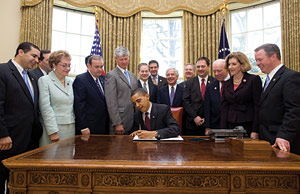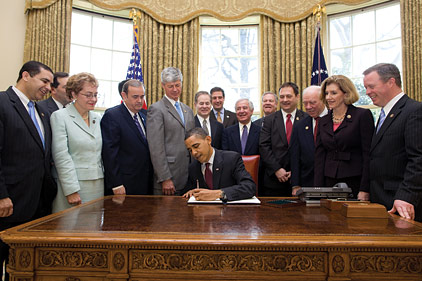
|
| Some business owners are uncertain how the Patient Protection and Affordable Care Act (PPACA), signed into law by President Barack Obama in March 2010, will affect their businesses financially in the near future. |
The Patient Protection and Affordable Care Act (PPACA), widely recognized as Obamacare, was signed into law by President Barack Obama in March 2010. It is intended to decrease the number of uninsured Americans and lower the overall cost of health care in the U.S.
But, as the law is implemented in phases over several years, some HVACR business owners are fearful of the program’s potentially detrimental effect on the cost of employee health care coverage.
Wait and See
Charlie McCrudden, vice president of government relations for the Air Conditioning Contractors of America (ACCA), said many businesses are left in limbo this year, waiting to see if the coverage they currently offer will qualify as affordable minimum coverage in 2014. If the coverage does not qualify, the business could potentially face fines.
“There’s a lot of uncertainty about what contractors will do about providing health care for their employees,” McCrudden said. “We’re still in the ramp-up for 2014, when the individual mandate kicks in, along with the opening of the exchanges, and whether or not plans now being offered will qualify under the essential benefits package. And, if these plans do not qualify, contractors who thought they were in the clear may now have to upgrade their coverage. That may cost them more.”
McCrudden said many businesses won’t know for months if their coverage will qualify. “The government is supposed to come out with these regulations later this year. The health care law was phased in over time, and that was by design, but that still doesn’t mean that anyone knows what’s going to happen three years out. We’re probably going to have just under a year’s notification on certain aspects of the law.”
Gerry McClelland, president of Service Heating & Plumbing Corp., Waterford, Mich., is admittedly struggling with the legislation’s uncertainty.
“I have spoken to several insurance agents, and they all tell me that my costs will be going up 20 to 80 percent, but they will not know more until September of this year,” McClelland wrote on The NEWS’ LinkedIn page. “I have always paid 100 percent of my employees’ health care. We also cover their spouses and children. We will see what the future brings.
“As a small business owner I just have to take the wait-and-see stance, and hope that I can continue to provide quality insurance for my employees. After all, my employees are my most important asset,” he added.
Stunting Growth
Under the PPACA, employers who have 50 or more full-time employees must provide insurance for their workers, or else face a penalty of $2,000 per employee. Staffing levels this year will be used to determine whether employers must provide insurance.
The potentially hefty fines are causing some employers who are teetering on the 50-employee threshold to stop hiring until they know how the health care legislation will affect them.
Bobby Jones, owner of Bob’s HVAC Heating, Ventilation, and Air Conditioning, Chico, Calif., said he has purposely made changes to his staffing as a direct result of the Obamacare legislation.
“California regulations and pending Obummer care have made employees of little or no value to my business,” Jones commented on The NEWS’ LinkedIn page. “I am now a one-man show with fewer hours and a higher net profit. My job as a business owner is to operate in the black.”
Continuing Coverage
Other contractors say that, despite the costs and uncertainty associated with Obamacare, they will continue to provide health insurance coverage for their employees.
Ann Kahn, president of Dallas-based Kahn Mechanical Contractors, said her company will continue to offer competitive health coverage to its employees and their dependents.
“We believe everyone is entitled to health care. We’ve offered coverage to our employees since 1974. Even in the lean years, we chose to cut expenses in other areas rather than have our people go without insurance,” Kahn said. “We believe nothing worth having comes without a price, and we are willing to chip in more than required to afford this benefit for our people.”
Ken Robinson, co-owner of Climate Pro Mechanical Inc., Los Alamitos, Calif., also said Obamacare won’t affect the coverage his business already offers to its employees.
“The Affordable Care Act will be barely noticeable to us and we do not intend it to modify the way we do business now in any way,” Robinson posted on The NEWS’ LinkedIn page. “We already provide good benefits to our employees, so the expense has been around for a long time with us. We actually expect that after several years, our health care cost, or at least the rate of increases we’ve experienced year over year, will reduce or correct once there is a larger pool of covered population. This happened with ‘RomneyCare’ in Massachusetts for two years in a row now.”
Side Effects
Another less talked-about effect of the health care legislation is the impact it has on some individuals’ spending habits, said Dave Dombrowski, of ARS/Rescue Rooter, Raleigh, N.C.
“The biggest change that we’ve seen, because we have close to 50,000 customers, is that the marketplace for our customer base has the highest degree of uncertainty ever,” Dombrowski said. “We can go into homes that are $400,000 homes, and they’re unwilling to make long-term decisions and investments because they don’t know what the future holds.”
Dombrowski said the atmosphere of uncertainty is definitely not limited to HVAC businesses, though it is particularly worrisome for an industry that suffered significantly during the recession.
“If insurance prices go up, I can budget for that. That’s included in the cost of doing business. However, what’s affecting us most is that our customer base is being eroded because of the country’s instability. We’re suffering from a lack of consumer confidence right now,” Dombrowski said.
The best way to overcome this consumer reluctance: education.
“It’s important that contractors take the time to educate their customers. We can’t just say, ‘it’s broken and we can fix it or put a cheap one in there.’ We have to tell customers that they have options without forcing them into a corner.
“We need to get through to the homeowner to say, we don’t know what the future will be and we know that you’re afraid, but there are basic needs that you have that need to be met. As individuals, we have a need for food, companionship, and shelter. As a consumer, you can say, ‘I don’t need a new car or a larger TV set, but you do need your heat on when there’s snow flying outside.’ ”
For more information on the Patient Protection and Affordable Care Act, visit www.healthcare.gov/law.
Publication date: 3/18/2013



Report Abusive Comment